This story was recently featured on an episode of PRX’s This American Life. Listen here or using the player below.
Aubree Campbell, 33, a poll watcher from Tarrant County, is pretty well known among Texas election administrators by now. The redhead and self-described “metalhead” basically has many of them on speed dial.
“Are your ballots pre-numbered sequentially beginning with the number one according to the Texas election code 52.062 and 52.009? You’re sitting in violation of the state and national Constitution. Do you not know the code and the law off the top of your head like I do?” she asked one, rapid-fire, in an audio recording she posted online in April.
Her social media channels are full of posts and self-recorded videos documenting these often charged interactions, carefully monitored by a small but loyal following that reacts on every post. She volunteers in elections routinely, has trained dozens of other poll watchers, and considers herself a knowledgeable watchdog of Texas election administration.
There’s a single election administrator in Texas who, she says, “makes other election administrators look like idiots” — Heider Garcia, who oversees elections in her home county.
It’s an interesting choice. Garcia, in fact, has received more rancor from voter fraud activists than most of the more than 200 people running elections across this state. They’ve accused him of contributing to voter fraud in other countries. Fringe activists groups shared his home address online, along with racist messages and death threats, making him fear for his life and the safety of his wife and small children.
But that hasn’t discouraged Garcia, who local and state officials say is breaking new ground in engaging and calming the burgeoning hysteria around the rules and procedures governing elections.
“If you were building a prototype for an election administrator, you would just copy Heider Garcia,” Secretary of State John Scott said.
For his part, Garcia said his approach felt simple to him. “There’s a choice here to make: to allow yourself to be intimidated and pushed to the side by lies and accusations, or to stand firm and say, ‘I have nothing to hide and I’m not gonna run anywhere.’ ”
On Election Day, Garcia’s work paid off. Poll watchers may have yelled at him and his workers during this year’s primary and during the 2020 election, but they didn’t do it during last week’s election.
Take Campbell, for example. After polls closed, she walked into the elections office to observe the count, signing in. Her first question? “Do you know where he is?” she asked a clerk, referring to Garcia. “He probably doesn’t want me walking around here too much on my own.”
Garcia, his staff, and others believe his approach to responding to questions and requests from Campbell and others is the reason for the activists’ courteous tone.
Officials like Scott, as well as county election administrators across the state, have taken note, beginning to use Garcia’s playbook as they work to address misinformation and the activists who spread it.
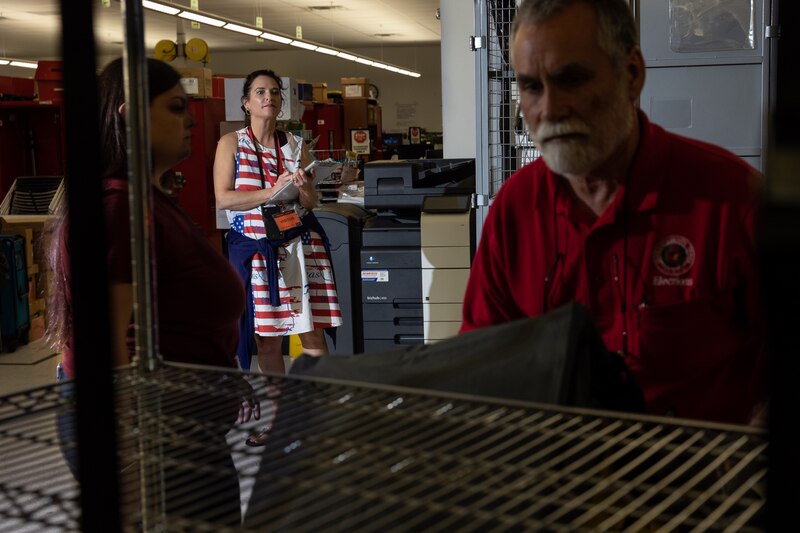
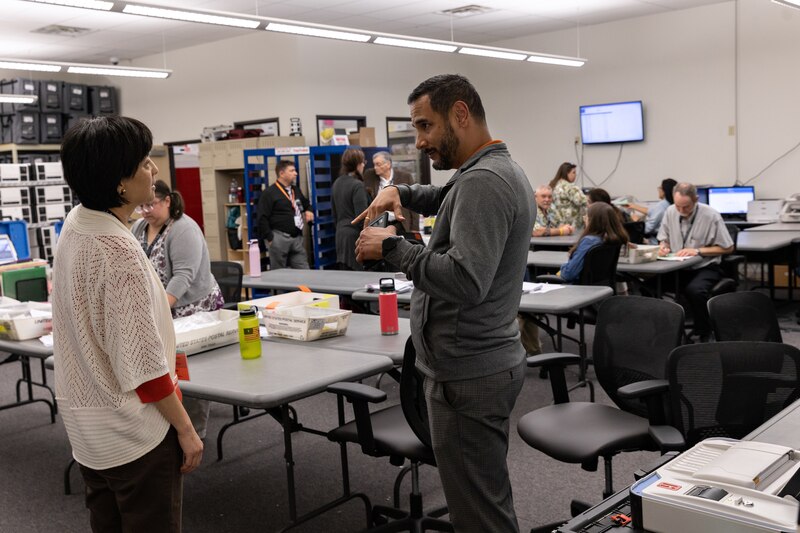
“Tactical patience”
Like a lot of election administrators, Garcia, 43, followed an indirect path to overseeing elections. Garcia was born in Pennsylvania to Venezuelan parents attending Penn State University. Once his parents graduated, they returned with Garcia to Venezuela, where he grew up. He became a computer engineer with dreams of landing a job as an animation software developer for movie studio giants like Pixar.
Instead he landed a job as a software developer for a voting systems company and spent 12 years working for election technology company Smartmatic. That job took him to places like Panama and the Philippines before he signed on as an elections manager in California. In 2018, Garcia took the job in Tarrant County.
Troy Havard, assistant election administrator and Garcia’s right-hand man, said Garcia’s resilience, built along his far-flung life path, differentiates Garcia from others. “I’ve learned some tactical patience from Heider,” he said.
In November 2020, President Joe Biden won Tarrant County by a small margin over former president Donald Trump. Soon after, as Trump and his allies began to spread lies about widespread voter fraud, Garcia’s office was flooded with public information requests from fringe activists. They wanted to inspect ballots, access voter rolls, and obtain emails between Garcia and the secretary of state’s office. The activists suspected malfeasance.
Then, some targeted him personally. A video about Garcia and his past job as a former programmer for Smartmatic alleges he was involved in voter fraud in the Philippines and in Venezuela. Fringe activists began posting Garcia’s home address online. He received racist messages and death threats.
“HUNT HIM DOWN,” one person tweeted. “Hang him when convicted from fraud and let his lifeless body hang in public until maggots drip out his mouth,” another tweet said.
But Garcia knows that there are different kinds of people he is dealing with. Some are online trolls driven by hate and trying to intimidate him with violent threats. Others are likely grifters, he said, seeking to take advantage of the people who come into his office genuinely looking for answers.
Those are the people he’s open to having a conversation with, he said.
“But it has to be fact-based. That’s one of the main pillars of all the work we’ve done: Let’s separate opinion from fact, opinion from policy,” Garcia said.
Garcia took the job in 2018, when election skepticism was already on the rise. He knew he had to start engaging, without any judgment, even back then. When poll watchers, for example, told him they wanted to see every single serial number for each voting machine, Garcia had his staff pull out the USB drives from the machines and write down each number for the watchers, which took hours to do. He knew that they’d want this again, and again, so now he performs this task ahead of every election so that he can have the numbers immediately available.
“They got what they wanted. We met their expectations,” Garcia said.
At a moment’s notice, he gives tours of the elections office to explain how the process works. He spends hours on the phone and has in-person meetings with skeptics if needed. Garcia has also made technical improvements to be as transparent as possible: He purchased large TV screens so poll watchers could clearly see the tabulating of election results on election night without hovering over staffers’ shoulders. In April, Garcia did an hours-long workshop to walk the public through every step of the election process in Tarrant County.
Initially for safety reasons, but now to get up to speed on the latest election conspiracy theories, Garcia daily monitors right-wing social media channels such as Truth Social. It also helps him anticipate the types of records requests and questions he’ll be getting from activists, he said.
“We see these channels and we’re like, here we go, gear up,” he said. For example, a few months ago, Garcia started noticing talk on those channels about requests for something called a cast vote record in other states. Sure enough, activists began requesting them in Tarrant County.
To make records requests — which continue to roll in — more manageable, Garcia puts information on his website when he can, making the information more accessible to everyone and easing the burden on his staff. This practice has become more common among Texas election administrators and counties that have election websites over the past two years.
This summer, Garcia went a step further, allowing dozens of the activists to spend days in his office so that they could inspect more than 300,000 paper ballots from the March 2020 primary in person — a task that took his four-to-five person staff about a month to prepare for, plus a staffer designated to be on hand whenever the activists were present. It was the first time an elections department in Texas accommodated an inspection of paper ballots on such a large scale.
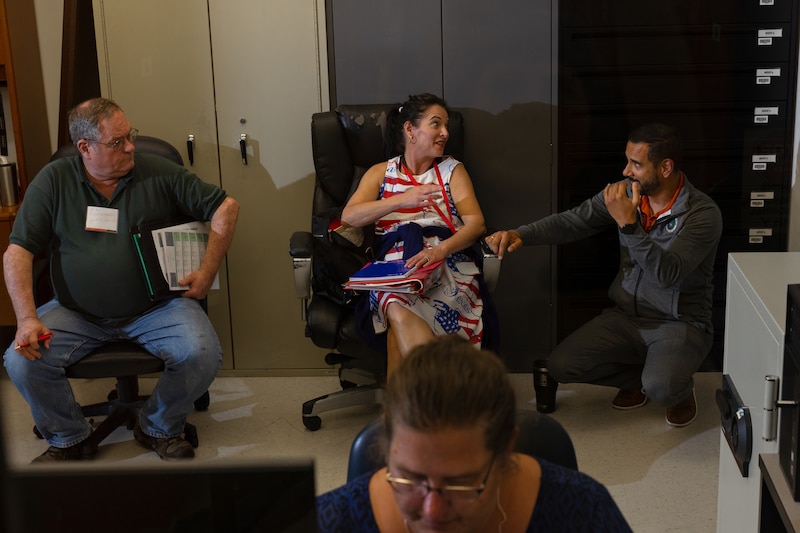
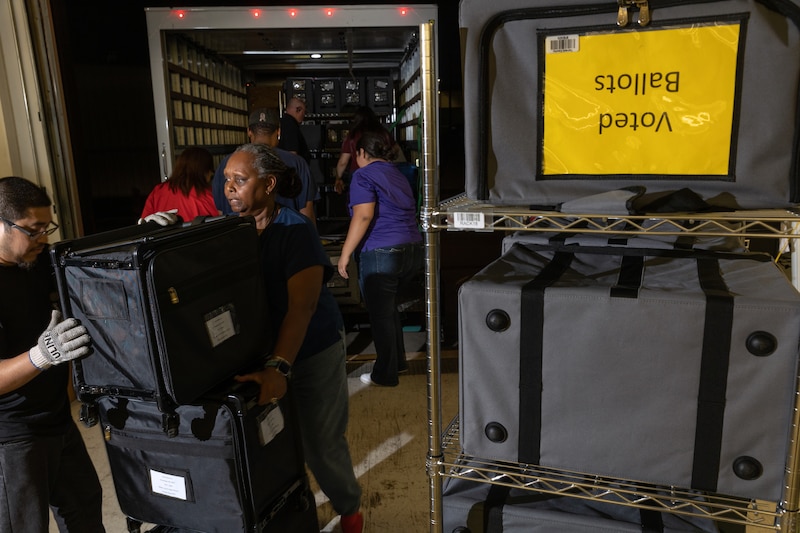
The new normal for election officials
The role of an American election administrator has evolved significantly since the first formal election in the United States. Now — after the 2016 and 2020 elections — they’re remarkably public-facing jobs.
Garcia said the only way forward is to learn to adapt to the new public oversight and interest.
“That’s how it’s going to be from now on. These groups are going to be actively reviewing records,” Garcia said. “That’s not a bad thing if it’ll help strengthen the confidence in the system.”
Chris Davis, the elections administrator in Williamson County, will adapt Garcia’s procedures in a few weeks, when he’ll also have activists in his office inspecting thousands of paper ballots. Davis said Garcia’s strategy of anticipating what activists want and providing as much information as possible will pay off.
“[Election administrators] are going to be doing things that have never been done before. Heider has proven that they can be done, and I like where that’s going,” Davis said. “But doing those things also takes time, staff, and personnel to do, too.”
That’s why experts say additional funding to recruit workers and to purchase the equipment needed to run a successful elections department is key. That’s especially true as election departments are facing increased scrutiny. So elections administrators’ success relies heavily on support from the top county officials who control the purse strings. Garcia has that support in Tarrant County, which has helped him manage the ongoing challenges.
“It’s important that we realize that the conduct of our elections doesn’t happen by little shoemaker elves,” said Tammy Patrick, senior advisor at the Democracy Fund and an expert in election administration. “We have to invest in the people that are going to conduct our elections. We have to give them the tools and the resources that they need in order to serve their communities.”
Tarrant County has 1.2 million registered voters and the budget for the elections department this year was about $9.7 million, which is up from $8 million the county approved in 2021.
“We take elections seriously, the staff takes it seriously,” outgoing Tarrant County Judge Glen Whitley said. “If [Garcia] tells us he needs something, then we’re going to get it for him. Because we’re all dedicated to having a transparent, high-integrity election.”
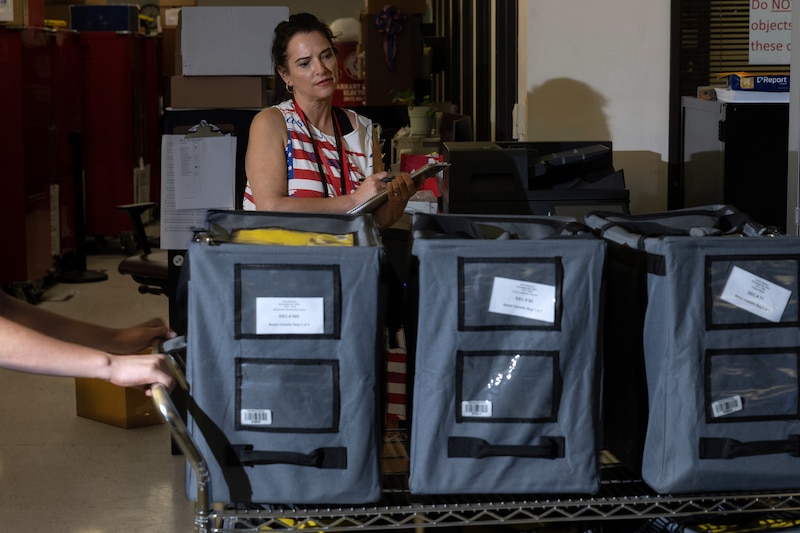
The inevitable lingering suspicions
On Election Day, Garcia’s staff — phone bank operators, voter registration staffers, and other clerks in the elections office — began their shifts before 6 a.m. Many did not leave until after 4 a.m. the next day.
Partway through the day, after workers had already been answering phone calls from voters with questions and troubleshooting issues at the polls for about eight hours, Garcia decided it was time for a quick run to the Fiesta Mart.
He brought back several boxes of a beloved chocolate candy from his Venezuelan childhood: Torontos. He walked around the office handing it out to all the workers. “That’s his favorite,” one worker said. A box of the chocolate he left in the break room was empty within minutes.
In an environment where election administrators around the country have been forced out out of the profession due to threats and harassment, Garcia has been able to keep his staff’s spirits up. But he knows that they, too, are under an unprecedented amount of pressure.
To some of those workers, it has become clear that no matter how much effort they put into being transparent and accessible, for some skeptics, it’ll never be enough. “Their minds are made up,” said Havard, the assistant elections administrator.
Under Texas’s new voting law, SB 1, passed last summer, poll watchers are allowed free movement inside polling locations and at central counting stations, where votes are tallied at the end of the night. A handful of poll watchers spent most of their time inside Tarrant’s central counting station on election night.
Campbell spent time that night moving between the central counting station and the room where the bipartisan ballot board processed mail and provisional ballots. She took notes, and said she was there to make sure the chain of custody forms for election election equipment (as they travel from polling location and back to the elections office) were filled out properly. “Because sometimes the workers are not trained properly, half of them don’t know what they’re doing,” she said.
Asked whether she witnessed any irregularities on Election Day, Campbell said, “Oh yeah. We’ll have some questions for Heider later.”
Campbell said she was suspicious, for example, about a voter who updated their voter registration at a polling site and was given a provisional ballot. (This is standard procedure in Texas.)
Poll watcher Mike Brewster, a retired airplane mechanic, also spent most of the night in the counting station. Brewster is against using electronic voting machines and has spoken regularly about the debunked conspiracy theory that voting machines “could possibly be connected to the internet” at commissioner court meetings for at least the past year.
Garcia has offered to let Brewster inspect the machine to prove there’s no internet modem or bluetooth connection in it. Brewster did not take him up on the offer because “It really doesn’t prove a great deal,” he said, adding that there’s “no transparency in the [elections] system.”
As long as bad actors continue to make money off the spread of disinformation about the election, the conspiracy theories won’t cease, Garcia said. And neither will the phone calls with questions, the public information requests seeking to inspect ballots, emails or the in-person meetings with activists who have questions.
His office has already received records requests for “every document each election judge produced at every polling place in the Nov. 8 election.”
But that’s OK. That’s now part of the job, Garcia said.
“We signed up for it. We’re public servants,” he said. “We have a saying in elections, that says, ‘You either quit in the first six months or you’re in it for life,’ and it’s because there’s a lot of satisfaction in helping your community and working in something that is so important.”
Natalia Contreras is a reporter for Votebeat in partnership with the Texas Tribune. Contact Natalia at ncontreras@votebeat.org.


